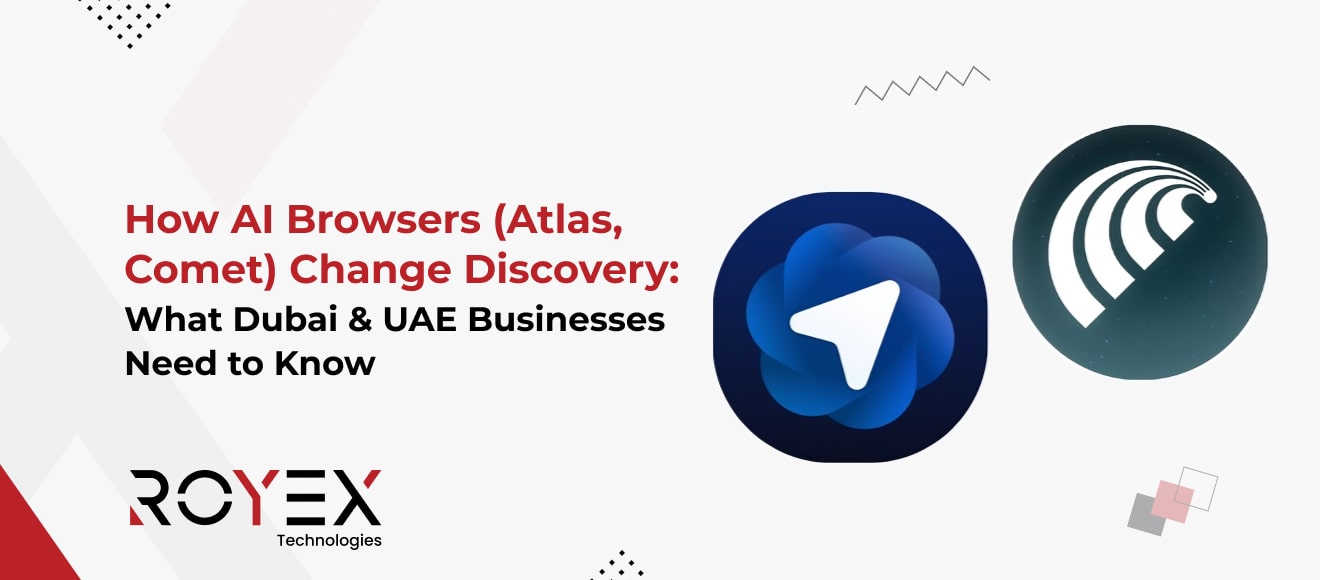
How AI Browsers (Atlas, Comet) Change Discovery: What Dubai & UAE Businesses Need to Know
Introduction
The way people discover, consume and act on web content is undergoing a seismic shift. With the advent of AI-powered web browsers such as ChatGPT Atlas (by OpenAI) and Comet (by Perplexity AI), the classic model of “search → click → website” is being challenged. For businesses in Dubai and the UAE—especially those leveraging localised, multilingual strategies—this presents both risks and opportunities. In this article we’ll explore what AI browsers are, how they change web discovery, the implications for businesses operating in the UAE, and steps you can take now to prepare. Finally, we’ll discuss why GEO (Generative Engine Optimization) is emerging as the new frontier in “natural traffic,” and why Royex Technologies is the ideal partner for this transition.
What are AI Browsers, and What Makes Atlas & Comet Different?
What is an AI browser?
An AI browser is a web browser that integrates large-language-model (LLM)-driven assistants or agents directly into the browsing experience. Instead of simply displaying web pages and links, it offers a “sidebar” or “assistant mode” that can:
-
Summarize content on a page
-
Compare options (products, services)
-
Answer questions about what’s on the screen
-
Automate tasks (agent mode) such as research, booking, shopping
This means the user might not need to click through to multiple websites—they interact with the assistant and the browser “does the work.”
What is ChatGPT Atlas?
ChatGPT Atlas is OpenAI’s new web browser built with ChatGPT at its core.
Key features:
-
A ChatGPT sidebar that can summarise, compare, and answer questions about any page visited.
-
“Agent Mode” (initially for paid users) where the assistant can browse and act on behalf of the user—for example research, shopping, etc.
-
Controls and settings around memory and data: users are opted out by default from data being used to train models.
-
Available initially for macOS, with Windows, iOS and Android to follow.
What is Comet?
Comet is the AI browser launched by Perplexity AI.
Key features:
-
Built-in AI assistant that works alongside browsing: summarises, automates tasks, supports voice and other modes.
-
Recently made free to everyone (whereas earlier it was paid) in order to broaden usage and challenge browser dominance.
-
Comet aims to treat browsing as task-oriented rather than passive. For example: planning, research, shopping.
Why this is a big deal
These browsers represent a new “front door” to the web: when the assistant is embedded, fewer users may start with traditional search engines or direct website visits.
The browser becomes an agent rather than just a “window to the web.” That means the interaction path changes.
For businesses, that means the moment of discovery shifts: instead of being found via a keyword in Google, you may need to be discoverable by the assistant’s inference, summarisation, and referrals.
For localised markets (Dubai/UAE) this means contextual, location-aware, multilingual, and action-ready content becomes more important than ever.
How Discovery Changes: From Keywords to Agents
Traditional SEO model
For many years, businesses have optimised for search engines (e.g., Google Search):
-
Identify relevant keywords (e.g., “mobile app development Dubai”)
-
Create content targeting those keywords
-
Build backlinks, authority, technical SEO
-
Users search, click a result, land on the site
This model relies on the user doing the search and choosing among links.
What AI browsers change
With AI browsers in the picture, several important shifts occur:
Less emphasis on links, more on summaries & citations
AI browsers can summarise multiple sources and present an answer without the user needing to click each link.
This means: being mentionable (cited) by the assistant becomes valuable as opposed to simply ranking.
Tasks become agent-oriented
Browsers like Comet enable the user to delegate tasks: “Plan a trip to Abu Dhabi under budget,” “Find best mobile app agencies in Dubai.”
For businesses, this means you must be ready not just to show up in search results but to be part of the workflow.
Personalisation and context matter
With integrated assistants and “memories” (in the case of Atlas) users can get customised results based on their past behaviour or context.
That raises the importance of local context, user intent, language, device, and task stage.
Reduced traffic from generic search links?
Some expert commentary suggests that with AI summarisation and task completion, fewer clicks may be needed to fulfill a user’s query.
That means businesses may see less “raw traffic” from search engines—but more value might come from being integrated in the “assistant path”.
Multimodal & multilingual content becomes more important
As assistants serve users across languages, device types, and task types (desktop, mobile, voice, chat), content must be structured to handle that—especially for UAE/Dubai businesses.
Implications for Dubai & UAE businesses
If your target audience includes UAE users, Gulf region, Arabic-speaking users, you’ll need to prepare for assistants that serve both English and Arabic (and possibly other regional languages).
Location-based queries remain critical—but now they must be integrated into content that is assistant-friendly: structured, task-oriented, ready to be cited.
Business listings, structured data (e.g., schema.org), local signals become even more important.
Conversion paths matter: since the AI can propose actions (“book a consultation”, “get a quote”), your website must be ready to support action triggers.
Strategic Shifts for GEO (Generative Engine Optimization) in the UAE Context
Defining GEO vs traditional SEO
SEO (Search Engine Optimization): Optimizing for search engines (Google, Bing, etc.), focusing on links, rankings, keywords, traffic.
GEO (Generative Engine Optimization): Optimizing for generative AI systems, assistants, and agentic browsing experiences.
Why GEO becomes essential
As AI browsers become common, discovery is less about “what link appears first” and more about “which source the assistant trusts and uses.”
For local/regional businesses (Dubai/UAE) the assistant will increasingly serve localized answers, so your content must speak to local nuances, languages, and tasks.
The value shifts from pure traffic to visibility inside the assistant workflow and completion of actions (quotes, bookings, chats).
For multilingual and multicultural markets, GEO helps you reach users in Arabic, English and other local vernaculars—ensuring you are visible when the assistant switches languages or regions.
What GEO entails for UAE businesses
-
Localized content hubs
-
Structured data and API endpoints
-
Action-integration readiness
-
Multilingual strategy
-
Task-oriented content
-
Local signals
-
Optimizing for voice & agent queries
-
Measurement shift
Challenges & Risks for UAE Businesses
Risk of reduced direct traffic
With assistants summarising and delivering answers, fewer users may click through.
Content-ownership & licensing concerns
AI browsers rely on sources they can trust and that have appropriate rights/licensing.
Data privacy and user trust
Browsers like Atlas emphasise memory features and user data controls.
Technical & structural readiness
Many sites are built for users, but AI assistants require structured content.
Local multilingual and cultural complexity
Serving UAE means catering to Arabic and English, possibly other languages.
Tactical Recommendations for Dubai & UAE Businesses
Here are actionable steps you can take now to prepare for this AI-browser-driven discovery shift:
- Audit your content for machine-readability
- Localise your content
- Prepare action-ready elements
- Craft content for the assistant’s summary style
- Focus on multilingual, multilingual-SEO & voice queries
- Measure and monitor new metrics
- Educate your team & clients
Why Dubai & the UAE Are Especially Poised for This Shift
-
High digital adoption
-
Multilingual environment
-
Local business fragmentation
-
Service economy
-
Regional visibility opportunity
Examples of Content Themes for UAE Businesses
Here are some concrete content ideas your business or your clients could produce now to ride this shift:
-
“How to Choose a Mobile App Development Agency in Dubai (2025 Buyer’s Guide)”
-
“Mobile App Development Cost in UAE – English & Arabic”
-
“GCC Ecommerce Development: 7 Local Firms That Delivered Results”
-
“Localising Your Website for Arabic-Speaking UAE Audience: A Checklist”
-
“What Happens When an AI Browser Finds Your Site? Insight for UAE Marketers”
-
“Multilingual SEO is Dead, GEO is Here: What UAE SMEs Need to Know”
-
“Ready for Voice & Chat: How UAE Businesses Can Optimise for AI‐Assistants”
-
“From Search Ranking to Assistant Citation: A Dubai Law Firm’s Story”
-
“Structured Data for UAE Local Business: How to Make Your Site Machine-Readable”
-
“How a UAE Tourism Company Optimised for AI Browsers and Boosted Bookings”
Why GEO is the Future of Natural Traffic
- Traffic isn’t going away—but the path changes.
- Action becomes the new goal.
- Visibility across devices & languages matters.
- Localisation becomes more strategic.
- Machine-readability and agent features matter.
- Competitive advantage goes to early adopters.
Why Royex Technologies Is the Best Partner for GEO
At Royex Technologies, we specialise in GEO—Generative Engine Optimization—for businesses in the UAE and GCC region. We are a specialized Generative Engine optimization (GEO) company in Dubai, helping businesses optimize their websites and digital content for AI-powered search engines and intelligent discovery feature
Here’s why we’re uniquely qualified:
-
Regional expertise
-
Technical capability
-
Content strategy & localisation
-
Conversion-centric approach
-
Monitoring & adaptation
-
Future-proofing
Conclusion
The era of traditional SEO isn’t over—it’s evolving. What’s emerging is a new paradigm of discovery through AI-powered browsers and assistants. Browsers like ChatGPT Atlas and Comet are already reshaping how users find and act on information.
By moving beyond ranking and into assistant readiness, task facilitation, action-driven experiences, and localised multilingual content, you position your business for the future of natural traffic. And in that transition, Royex Technologies is well-placed to guide you—bringing the technical, content, and local expertise required to succeed.





